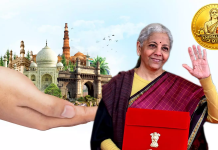With a view to develop sustainable and responsible tourist destinations and promote sustainable tourism in the country, Ministry of Tourism in association with Indian Institute of Tourism and Travel Management (IITTM), UNEP and Responsible Tourism Society of India (RTSOI) organised the second regional workshop on Development of Sustainable and Responsible Tourist Destinations at Kolkata on 11th January, 2023. The workshop witnessed wide participation of senior Government officials and tourism industry stakeholders from the States/ Union Territory of the Eastern region viz. Andaman & Nicobar Islands, Bihar, Jharkhand and West Bengal.
Keynote address at the workshop was delivered by Shri Prashant Ranjan, Director, Ministry of Tourism. In his address, he highlighted the need for sustainability in tourism and significance of Centre, State and Industry collaboration in achieving this objective. He also spoke about the Hon’ble Prime Minister`s vision for environmental sustainability and developing border tourism and emphasized on the ways in which tourism can be aligned with LiFE Mission. He also highlighted India’s opportunity to leverage the upcoming G20 meetings at various locations to position ourselves as a global leader in Sustainable and Responsible Tourism.
Dr Saumitra Mohan, IAS, Secretary (Tourism), West Bengal set the State level context for Sustainable Tourism. He introduced State initiatives such as the Kolkata Integrated city Pass, ‘Patha Sathi’ wayside amenities throughout the State, Ecotourism Parks, and Homestay Registration under which more than 2000 homestays are registered in West Bengal. He emphasised on participation of tourism industry and stakeholders for the implementation of responsible behaviour across the tourism operations.
Shri Uttank Joshi, Assistant Director General, Ministry of Tourism shared success stories of Swadesh Darshan 1.0, the flagship centrally sponsored scheme of Ministry of Tourism for creating tourism infrastructure in the country. He also gave an overview of Swadesh Darshan 2.0 and illustrated how it integrates sustainability in destination development.
Shri Anirudh Chaoji, representative of RTSOI deliberated with the participants on the need for sensitising the tourist and creating a demand for responsible travel. He introduced the Responsible Travellers campaign and explained ways to educate tourists about responsible behaviour.
Ms. Manisha Choudhary, Program Officer, United Nations Environmental Programme (UNEP) shared some landmark efforts like the Global Tourism Plastics initiative and the Glasgow Declaration on Climate Action in Tourism launched in November 2021 in climate change CoP 26. Interventions at State Level and guidelines on plastic waste management in tourism sector were highlighted. She encouraged stakeholders to join such initiatives and set targets to address crisis of climate change, pollution and biodiversity loss in alignment with national and global commitments for sustainable development.
Presentations were also made by representatives of State and UTs Tourism Departments from Eastern region, calling attention to their best practices in sustainable tourism as well as challenges in implementation of sustainable tourism which were addressed by Ministry of Tourism, UNEP, and RTSOI.
Central Nodal Agency for Sustainable Tourism, Indian Institute of Tourism and Travel Management briefed the participants about the salient features of Sustainable Tourism Criteria for India (STCI). The participants also took the Travel for LiFE pledge to seek their commitment towards travelling responsibly.
Grassroots industry stakeholders also presented their innovative ways of implementing sustainable tourism and success stories in different regions of eastern regions to create tangible positive impact.
The workshop strengthened the engagement among the Ministry of Tourism, State Governments/ UT Administrations and Industry stakeholders towards achieving Sustainability Goals.














